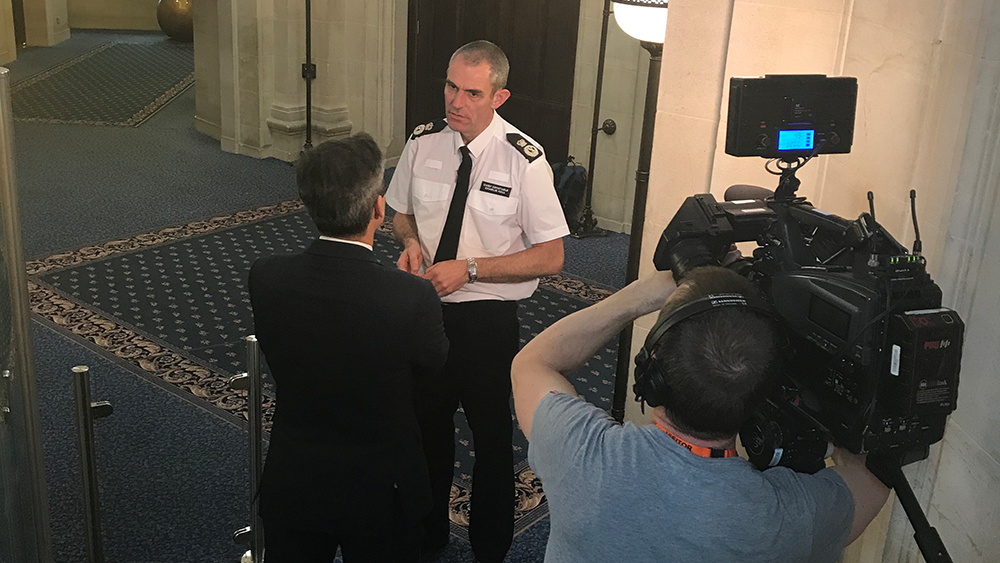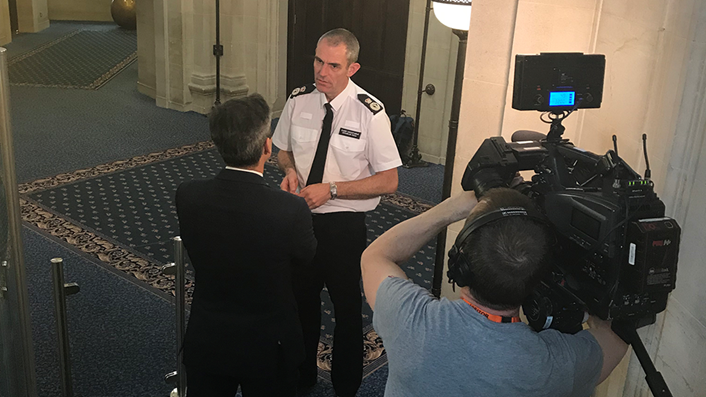
04 Apr 2019
Police are well prepared for a potential no-deal EU Exit
Police have prepared for a range of scenarios in the event of the UK leaving the European Union without a deal, including planning for potential protest, crime and emergencies.
The National Police Chiefs’ Council (NPCC) is leading police planning at national level working with the Government, other public services and partners. A national unit has been established to gather and share intelligence from across policing with the Government.
Police forces are part of a multi-agency response to potential issues at local level through local resilience forums, which are made up of representatives including emergency services, local authorities, health services and the Environment Agency. Local resilience forums have been planning for the impact of potential delays at and around ports including traffic disruption and response to any shortages of commodities.
National Police Chiefs’ Council Chair Martin Hewitt said:
“Our planning considers what might happen and the worst case scenarios. We are not predicting these outcomes but we are preparing for them.
“As the public would expect, we will continue to gather intelligence, consider potential threat, risk and harm and have plans in place to respond proportionately. This planning involves looking at potentially unusual or unique challenges but most of it is routine and we have tried and tested plans and approaches.
“There are strong views on EU Exit and often loud and passionate debate. There’s a responsibility on us all to think carefully and be temperate in how we communicate so we don’t inflame tensions.”
National Police Chiefs’ Council Lead for Operations, Chief Constable Charlie Hall said:
“At the moment, we have no intelligence to suggest there will be rises in crime or disorder but we are well prepared to respond to any issues that may arise.
“We expect to see more protests in the coming weeks but we have no intelligence to suggest that protests will be anything other than peaceful, as they have been to date.
“We will always seek to facilitate the right to peaceful protest, balancing the right to protest with disruption to local communities. We work with protest organisers to achieve this.
“The public can help us keep protests safe by being vigilant for anyone or anything that looks out of place or suspicious and reporting it to a member of staff, security or police.
“Police are trained and equipped to maintain public order and have established plans to surge officers within force or mobilise officers across the country if necessary.”
Police forces routinely share officers to ensure an appropriate police presence exists where there is increased demand for it.
As part of established plans to respond to any widespread disorder or emergencies, police forces are required to mobilise a certain number of officers within a set time period. Over 10,000 officers are trained and available to respond to national issues in extremis. These plans have been tested and exercised in recent months.
The National Police Coordination Centre manages this mobilisation. Mutual aid requests are made based on a strategic threat and risk assessment of incidents and the length of mobilisation will depend on the circumstances of the incident.
CC Charlie Hall said:
“National and global events have the potential to trigger short-terms rises in hate crime and we saw this with the significant spike following the EU Referendum in 2016.
“The level of hate crime has reduced since the 2016 referendum and we have not seen a sustained spike in the past two months, but on average it is still higher than it was before the referendum. Police forces will be carefully monitoring tensions and hate crime.
“More than ever, we want to assure victims of hate crime that we’ll take your reports seriously and help you get the support you need. We will prosecute where evidence allows us to do so.”
Crimes committed against someone because of their disability, transgender-identity, race, religion or belief, or sexual orientation are hate crimes and should be reported to the police.
Hate crimes can include:
- threatening behaviour
- assault
- robbery
- damage to property
- inciting others to commit hate crimes
- harassment
Report hate crime to police by calling 101, 999 in an emergency or online at www.report-it.org.uk. More information about hate crime is available here.
Commander Adrian Usher, who leads on MP security at the Metropolitan Police, said:
“In recent weeks, police forces have contacted their local MPs to ensure they have appropriate, proportionate and effective security advice and security arrangements. This is important to us because our elected representatives must be able to express themselves and go about their business without facing abuse or harassment. We will take any reports or concerns from MPs, their families of staff extremely seriously.”
Notes to editors:
Reports of crime submitted nationally with some link to EU Exit: 26 in the week to March 29 and 11 in the week to March 22. Over half of these reports relate to malicious communications and other instances to verbal abuse, harassment and protest activity.
NPoCC assessed that nearly 10,000 officers were deployed to the operation for President Trump’s visit to the UK in 2018. This included a range of roles beyond public order policing.
The national mobilisation plan and requirements are always in place to respond to planned events and spontaneous national issues or emergencies, that includes being able to deploy 10,000 officers as a minimum. We are not planning or preparing for mobilisation at that level as we have no intelligence to suggest there will be an increase in disorder but we are ready to respond if required.
In the national mobilisation plan, 10% of the mobilisation commitment must be met within an hour, 40% within 4 hours, 60% within 8 hours and the full commitment within 24 hours.
Contact information
Communications office
By phone: 0800 538 5058
By email: press.office@npcc.police.uk

